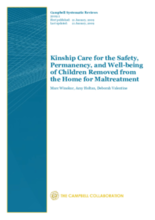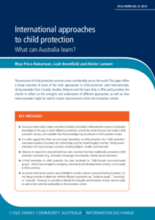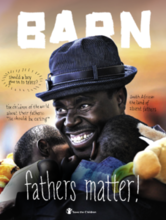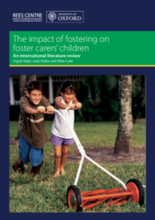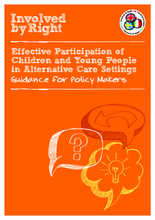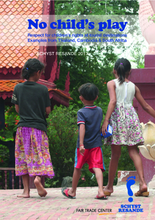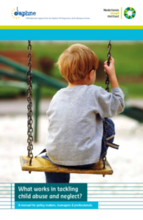Displaying 121 - 130 of 138
This article provides an overview of the current situation in the out-of-home care in Norway and Sweden. Development in later years is described and discussed, including the trends towards privatization of the welfare system in both countries and the role of private, commercial actors within the care sector including out-of-home care for children and young people.
This systematic review published by the Campbell Collaboration reviewed controlled experimental and quasi experimental studies in which children removed from the home for maltreatment and subsequently placed in kinship care were compared with children placed in non-kinship foster care for child welfare outcomes in the domains of well-being, permanency, or safety.
This paper offers a broad overview of some of the main approaches to child protection used internationally. Using examples from Canada, Sweden, Belgium and the Gaza Strip, it offers policy-makers the chance to reflect on the strengths and weaknesses of different approaches, as well as how these examples might be used to inspire improvements within the Australian context.
Barn is a magazine about children’s rights published by Save the Children Sweden with four issues per year. This issue is focused on the role of fathers in children’s wellbeing and development.
The aim of this article is to examine unaccompanied minors’ experiences of leaving care in Sweden, and to explore the experience in relation to perceptions about ethnicity and culture within a transnational space.
This literature review by the Rees Centre for Research in Fostering and Education at the University of Oxford was undertaken to identify the ways in which carers’ children might be more effectively prepared and supported when their families are fostering.
This guidance aims to raise awareness of the importance of children and young people in alternative care settings being able to make, influence and participate in decisions about their own lives, and other matters affecting them.
This report was commissioned by the Swedish network Schyst Resande and conducted by the Fair Trade Center, with the overall objective of raising awareness of children’s rights in relation to tourism and travel destinations which many Swedish tourists visit.
This manual is the main outcome of the European Commission Daphne III programme, Prevent and Combat Child Abuse: What works? Involving regional exchanges and research from five countries (Germany, Hungary, Portugal, Sweden and the Netherlands), this manual brings together knowledge on what works in tackling child abuse. The manual suggests evidence and practice-based prevention and response strategies against child abuse and neglect, including programs and services that have been shown to be successful in strengthening family care.
This article, from the Children and Youth Services Review special issue on ‘Young People's Transitions from Care to Adulthood’ examines the school performance and psychosocial wellbeing of care leavers in Sweden.

